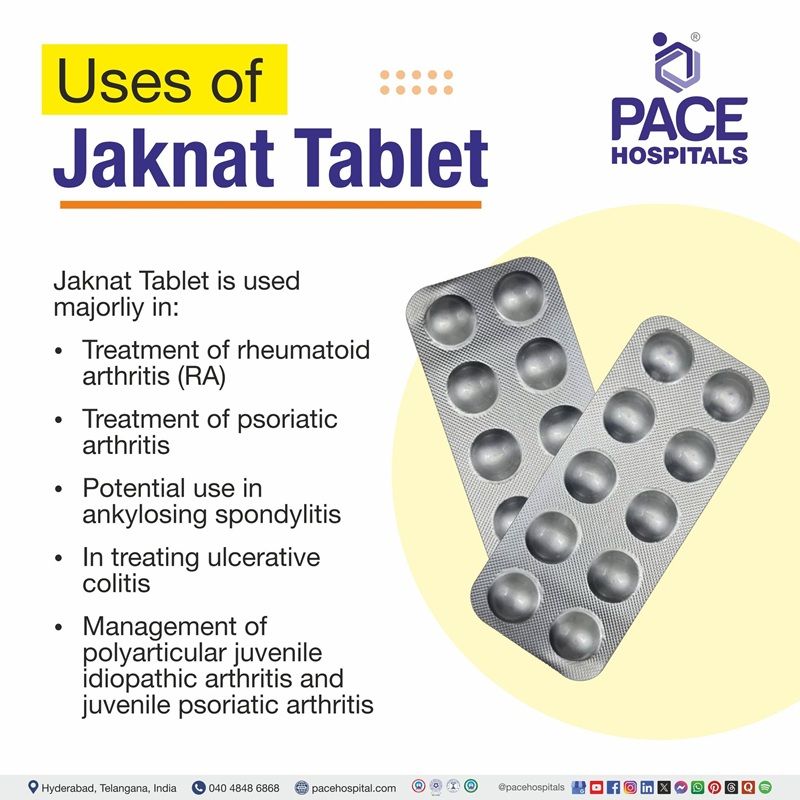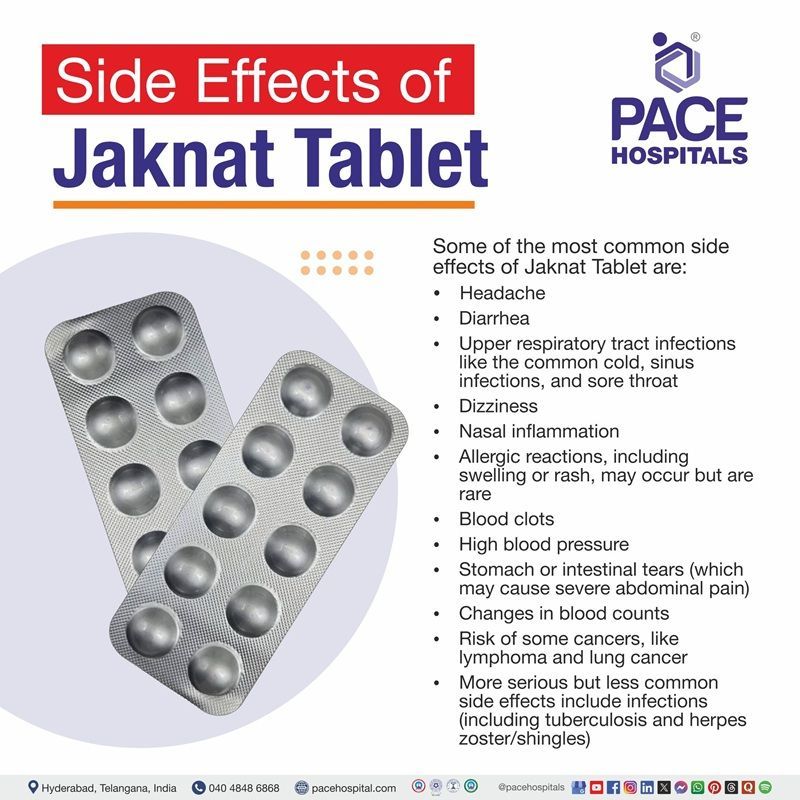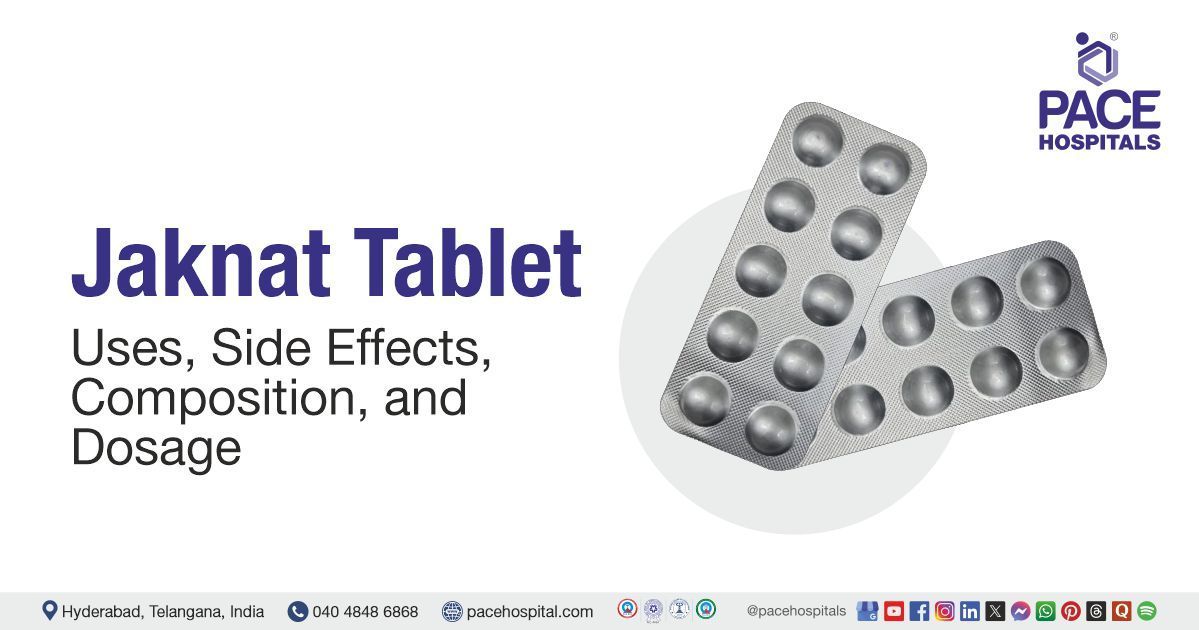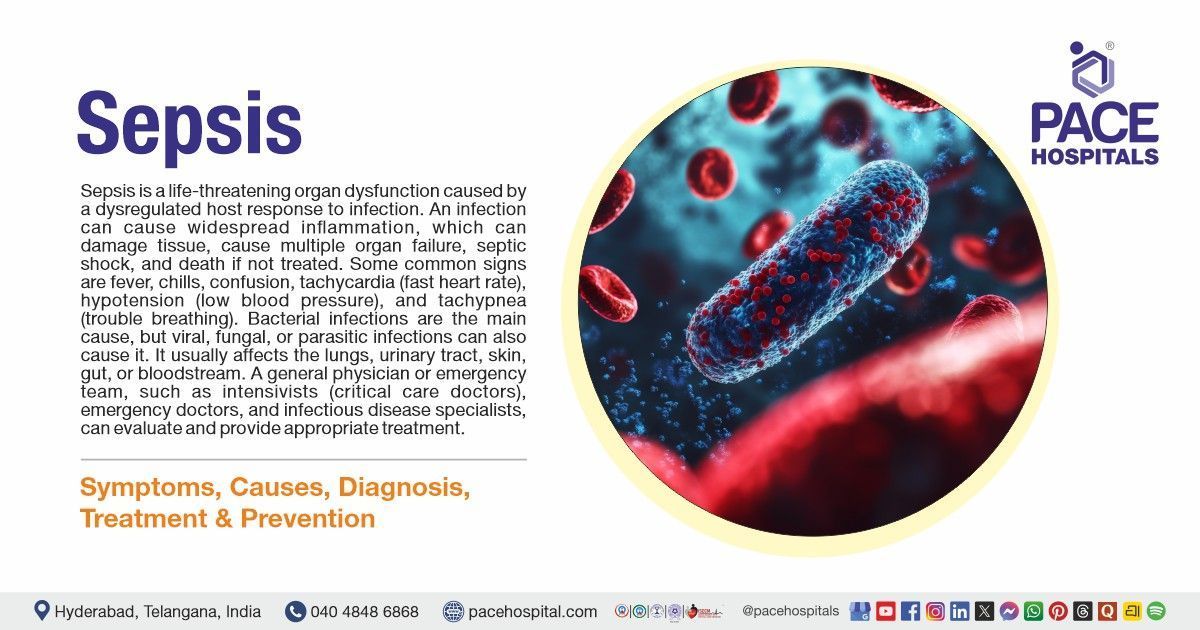Jaknat Tablet – Uses, Side Effects, Composition, and Dosage
PACE Hospitals
Manufactured by:
Natco Pharma Ltd.
Class: Jaknat tablet is a Janus kinase (JAK) inhibitor containing tofacitinib
Overview
- Jaknat (Tofacitinib) tablet belongs to the group of medicines called Janus kinase (JAK) inhibitors. It is a JAK1/JAK3 inhibitor authorised for use in several countries to treat moderate to severe rheumatoid arthritis, psoriatic arthritis, ankylosing spondylitis, and ulcerative colitis, especially in patients who have had an inadequate response to other therapies. Jaknat tablet selectively inhibits JAK enzymes involved in the signalling pathways of pro-inflammatory cytokines, thereby reducing immune system overactivity and inflammation in autoimmune disorders.
- In 2012, tofacitinib, the active ingredient in the Jaknat tablet, received approval in several countries, including the US, for the treatment of rheumatoid arthritis. Since then, approvals have expanded to include psoriatic arthritis and ulcerative colitis.
Jaknat is available in 5 mg and 10 mg immediate-release tablets (typically taken twice daily), and 11 mg extended-release tablets (taken once daily). It is not authorised for the treatment of hypertension or cancer.
- These include conditions like rheumatoid arthritis (RA), where the body's immune system attacks its own joint tissue, causing pain, swelling and stiffness.
- Jaknat tablet helps by blocking Janus kinases, a key enzyme in the inflammatory pathway. This leads to a reduction in joint damage, pain, swelling, and other symptoms linked with autoimmune inflammation.
- It helps relieve autoimmune symptoms such as joint pain, stiffness, and swelling by suppressing immune-mediated inflammation. As a result, it reduces immune system activity and may increase the risk of infections, headache, high cholesterol, or elevated liver enzymes. It is only available in the form of immediate-release or extended-release tablets.
Jaknat Tablet Composition
- Jaknat 5 mg Composition - Each Jaknat tablet contains Tofacitinib 5 mg (immediate-release). Packaging - Strip of 10 tablets.
- Jaknat 10 mg Composition - Each Jaknat tablet contains Tofacitinib 10 mg (immediate-release). Packaging - Strip of 10 tablets
- Jaknat 11 mg Composition: Each Jaknat XR tablet contains Tofacitinib 11 mg (extended-release), designed for once-daily dosing. Packaging: Strip of 10 tablets.

Jaknat Tablet Uses
The uses of Jaknat Tablets (5 mg, 10 mg, 11 mg, which are formulations of tofacitinib) are as follows:
- Treatment of rheumatoid arthritis (RA): Jaknat tablet reduces joint pain, stiffness, and swelling by suppressing the immune system inflammation. It slows joint damage progression and improves physical function and quality of life.
- Treatment of psoriatic arthritis: It alleviates the joint inflammation and skin symptoms by inhibiting inflammatory pathways. Jaknat tablet helps to reduce pain, stiffness, and swelling, improving mobility and disease control.
- Potential use in ankylosing spondylitis: Jaknat tablet reduces inflammation in the spine and major joints, thereby decreasing pain and stiffness. It enhances flexibility and slows disease progression for better daily function.
- In treating ulcerative colitis: the medication helps reduce inflammation in the colon, relieving symptoms such as abdominal pain,
diarrhoea, and bleeding. It promotes remission and prevents frequent flares.
- Management of polyarticular juvenile idiopathic arthritis and juvenile psoriatic arthritis: Jaknat tablet manages joint pain, swelling, and stiffness in children aged 2 years and older by targeting immune overactivity, improving joint function and growth outcomes.
Jaknat tablet off-label uses
- Jaknat tablet's immunomodulatory effects have led to its off-label use in refractory systemic rheumatic diseases, such as SAPHO syndrome.
- Jaknat (Tofacitinib) is increasingly being prescribed off-label for challenging dermatologic conditions that do not respond to first-line treatments. Randomised controlled trials have shown their effectiveness in disorders like atopic dermatitis, alopecia areata, and plaque psoriasis.
- This medication emphasises immune-mediated inflammatory conditions resistant to usual treatments, highlighting infection risks and monitoring needs. However, it is not approved for the treatment of cancer or
hypertension.
- It is contraindicated in active infections and requires caution in patients with a history of serious diseases or liver problems.
Guidelines to follow while taking the Jaknat (Tofacitinib) tablet
- Jaknat (Tofacitinib) tablets must be taken exactly as prescribed by the physician. The tablets are generally swallowed whole with water and should not be chewed, broken, or crushed.
- For consistent therapeutic effects, it is recommended to take the medication at the same time each day. Jaknat can be taken with or without meals, though taking it with meals may help to reduce stomach upset.
- If a dose is missed, it must be taken as soon as possible, unless it is close to the time for the next dose. In that case, the missed dose must be skipped, and doses should never be doubled to make up for it. Do not stop or skip doses without consulting the doctor.
- It is important to inform the doctor about all the other medications and supplements being used and to report any signs of infection, such as fever or cough, promptly.
- Because of the risks of infections, blood disorders, and high cholesterol, it is necessary to regularly monitor blood counts, liver enzymes, and lipids. Depending on the results of laboratory tests, dosage changes or cessation may be required.
- Patients with kidney and liver impairment may require dosage adjustment and must undergo regular blood tests to monitor for adverse effects.
- Live vaccines should be avoided during treatment, and ongoing monitoring by a doctor is essential to ensure safety and efficacy throughout the therapy
Jaknat tablet mechanism of action
- Jaknat tablet is a targeted therapy used to treat autoimmune disease by modulating immune cell signalling. Jaknat mainly works by inhibiting the activity of janus kinase (Jak) enzymes, mainly JAK1 and JAK3, which play a vital role in signalling pathways that regulate inflammation and immune responses.
- Jaknat tablet disrupts the JAK-STAT signalling cascade by blocking these JAK enzymes, which stops extracellular signals that encourage the synthesis of inflammatory mediators from being transmitted.
- This inhibition reduces inflammation and immune activity, which is beneficial in providing relief from symptoms of pain, swelling and joint damage associated with autoimmune diseases like rheumatoid arthritis, psoriatic arthritis, and ulcerative colitis.
- Unlike nonsteroidal anti-inflammatory drugs (NSAIDs) that mainly inhibit prostaglandin synthesis, Jaknat modulates intracellular signalling pathways to control immune activation.

Jaknat tablet side effects
Jaknat (tofacitinib) side effects may or may not occur, and the medication is often well-tolerated when taken as prescribed. Uncommonly, patients may experience one or more of the following mild symptoms:
- Headache
- Diarrhea
- Upper respiratory tract infections like the common cold, sinus infections, and sore throat
- Dizziness
- Nasal inflammation
- Allergic reactions, including swelling or rash, may occur but are rare
- Blood clots
- High blood pressure
- Stomach or intestinal tears (which may cause severe abdominal pain), and
- Changes in blood counts
- Risk of some cancers, like lymphoma and lung cancer
- More serious but less common side effects include infections (including tuberculosis (TB) and herpes zoster/shingles)
Regular monitoring and prompt medical attention for symptoms of infection, blood clots, or allergic reactions are essential during treatment with Jaknat.
NOTE: If any of the above symptoms are noticed, it is recommended to contact the concerned doctor immediately.
Jaknat dosage
Jaknat is a Janus kinase (JAK) inhibitor used to treat rheumatic conditions, such as rheumatoid arthritis and ankylosing spondylitis, and ulcerative colitis.
Jaknat dosage for adults
Jaknat is approved for moderate to severe autoimmune diseases like psoriatic arthritis, rheumatoid arthritis, ankylosing spondylitis, and ulcerative colitis. Dosage depends on the condition:
- Rheumatoid Arthritis, Psoriatic Arthritis, Ankylosing Spondylitis: 5 mg immediate-release tablets twice daily or 11 mg extended-release tablet once daily.
- Ulcerative Colitis: Induction dose of 10 mg immediate-release tablets twice a day for up to 8 weeks, then followed by a maintenance dose of 5 mg twice daily.
- Dose adjustments may be made based on the clinical response and tolerability under medical supervision.
Jaknat dosage in paediatrics
Jaknat is approved for children aged 2 years and older with polyarticular juvenile idiopathic arthritis (pcJIA) and juvenile psoriatic arthritis (JPsA). Dosing is weight-based and must be individualised by pediatric specialists.
Jaknat dosage in older patients
No overall dose adjustment is recommended solely based on age, though older adults may have heightened sensitivity to adverse effects, particularly infections. Clinical monitoring is advised.
Jaknat dosage in Hepatic or Renal Impairment
- For the patients taking Jaknat (tofacitinib) tablets with moderate to severe liver or renal impairment, the recommended dose adjustment is usually to reduce the dose to 5 mg once daily. Always follow medical supervision to ensure safety and efficacy, which includes:
- In moderate hepatic impairment (Child-Pugh B), reduce the dose to 5 mg once daily if the usual dose is 5 mg twice daily, or to 5 mg twice daily if the usual dose is 10 mg twice daily.
- Use in severe hepatic impairment (Child-Pugh C) is generally not recommended or contraindicated.
- For moderate to severe renal impairment, the creatinine clearance must be less than 30 ml/min, and dose reduction to 5 mg once daily is recommended if the usual dose is 5 mg twice daily; for higher doses, adjust accordingly, and remain on the reduced dose even after haemodialysis.
- These adjustments are necessary due to altered drug metabolism and elimination in such conditions to avoid toxicity
Jaknat dosage for Pregnancy and Lactation
The Jaknat tablet should be used in pregnancy only if needed and prescribed by a doctor due to potential risks. Nursing mothers should avoid use unless directed by a healthcare professional, as safety is not well established.
Overdose of the Jaknat (tofacitinib) tablet
From an overdose with Jaknat (tofacitinib) tablets, symptoms may include headache, nausea, and diarrhea, and in some cases, worsening of known side effects like infections or gastrointestinal issues. Management is primarily supportive, with close clinical monitoring, and may require prolonged observation depending on the severity and drug profile. Immediate medical attention should be sought in all suspected overdose cases.
Contraindications of the Jaknat tablet
Jaknat tablet is contraindicated in the following conditions:
- In patients with active infections, such as systemic or localised bacterial, viral, fungal, or mycobacterial infections like tuberculosis, Jaknat tablet should not be started.
- For patients with severe liver impairment (Child-Pugh C), Jaknat tablet use is not advised.
- It is not used with other biologic DMARDs or potent immunosuppressants like azathioprine or cyclosporine concomitantly due to increased immunosuppression risk.
- Due to the reported higher incidence of lung cancer and lymphoma, particularly in smokers, patients with a history of cancer or conditions that raise the risk of cancer are advised to use it with caution.
- Jaknat is contraindicated in pregnancy and breastfeeding because of potential harm to the fetus or infant.
- Jaknat tablet usage in children under 18 years of age is generally not recommended.
Warnings and precautions of the Jaknat tablet
- Serious Infections: Do not use Jaknat during active serious infections, including localised infections. Patients are at greater risk of infections like tuberculosis, bacterial, fungal, viral, and other opportunistic infections. If a severe infection develops, treatment should be interrupted until the infection is controlled. Screening for latent tuberculosis and viral hepatitis is recommended before starting treatment, and monitoring for infections during therapy is essential.
- Malignancy and Lymphoproliferative Disorders: Cases of lymphoma and other malignancies, including non-melanoma skin cancer, have been reported in patients treated with Jaknat. The risk is higher in patients with prolonged immunosuppression.
- Thrombosis: Increased risk of pulmonary embolism, deep vein thrombosis, and other thromboses, some of which have been fatal, has been reported, especially in patients treated with higher doses (10 mg twice daily). Use with caution in patients having risk factors for thrombosis; avoid use in patients at high risk.
- Major Adverse Cardiovascular Events (MACE): There is an increased risk of serious cardiac-related events such as a heart attack or stroke, especially in patients with cardiovascular risk factors and a smoking history.
- Tuberculosis: Screening for latent or active tuberculosis is done before initiating therapy.
- Gastrointestinal Perforations: Reports of gastrointestinal perforations have occurred. It is used cautiously in patients with a medical history of diverticulitis or those taking concomitant corticosteroids or NSAIDs.
- Laboratory Abnormalities: Regular monitoring is recommended for blood counts, liver enzymes, and lipid levels. Elevations in cholesterol and liver enzymes have been observed with use.
- Use in Special Populations: It is used cautiously in patients with renal and hepatic impairment. It is not recommended during breastfeeding and pregnancy unless the potential benefit justifies the risk. The risk of infections and malignancies is higher in elderly patients.
Jaknat tablet interactions
When two or more pharmaceuticals react, it's termed a drug interaction; when the drug and food interact, it's called a food interaction. An interaction between a medication and a disease is called a disease-drug interaction.
Drug interactions
- Jaknat is metabolised mainly by liver enzymes CYP3A4 and CYP2C19, so drugs that inhibit these enzymes, like ketoconazole, ritonavir, and voriconazole, can increase Jaknat levels and risk of side effects, warranting dose reduction.
- Drugs that induce these enzymes, such as rifampin, St. John's Wort, and apalutamide, can decrease Jaknat's effectiveness by lowering its blood levels.
- Combining Jaknat with other immunosuppressants or biologic DMARDs like abatacept, azathioprine, and cyclosporine increases immune suppression and infection risk and should generally be avoided.
- Avoid combining with other JAK inhibitors or potent immunosuppressants to reduce the risk of chronic infections.
- Cautious use or dose adjustment may be needed with drugs like lopinavir, aprepitant, ritonavir, bicalutamide and specific chemotherapy agents.
Food and alcohol interactions
- There are no known significant food interactions with the Jaknat tablet.
- Alcohol impact is unclear, but due to immune and liver effects, alcohol should be used cautiously or avoided during Jaknat therapy.
Disease interactions
- Patients with active serious infections such as tuberculosis, viral, bacterial, and fungal infections should not start or continue Jaknat until the disease is treated.
- Jaknat tablet increases the risk of infections, malignancy, including lymphoma, thrombosis (blood clots), and cardiovascular events; caution is needed in patients with these risks.
- Use cautiously or avoid in patients with kidney or liver impairment; dose adjustments may be required.
- Patients with a history of blood clots, malignancies, or immune-compromising conditions need close monitoring.
- Live vaccines are contraindicated during Jaknat use due to infection risk.
Jaknat storage
Jaknat tablet should be stored in a cool and dry place away from direct sunlight, at room temperature, and out of children's reach.
Frequently Asked Questions on Jaknat (tofacitinib) tablet
What is the use of Jaknat Tablet?
Jaknat tablet contains tofacitinib, which is used primarily to treat autoimmune conditions such as psoriatic arthritis, ulcerative colitis, rheumatoid arthritis, and ankylosing spondylitis. It helps reduce joint pain, swelling, and inflammation by regulating the immune system. It is also used for certain juvenile arthritis types. Jaknat controls symptoms and slows disease progression by targeting key immune enzymes involved in inflammation.
Can Jaknat 5mg be taken with food?
Yes, Jaknat 5mg Tablets can be taken with or without food. Taking it with food may help reduce any stomach upset that some people experience when taking this medication. The important part is to take the medicine regularly and at the same time each day for consistent effects, regardless of food intake.
What precautions should be taken while taking Jaknat?
Precautions include informing the doctor about any infections, immune system problems, or organ disease, such as liver or kidney issues. Avoid starting Jaknat in a patient who has an active infection. Regular blood tests are needed to monitor side effects. Avoid using live vaccines during treatment and report any signs of a disease, unusual bruising, or breathing problems immediately.
Does Jaknat affect sleep?
Sleep disturbances are not usually reported as a side effect of the Jaknat tablet. However, some patients may experience dizziness or headache, which could indirectly affect sleep quality. If sleep problems occur during treatment, consult a doctor for assessment and management.
What are the most common complications of Jaknat?
Common complications include mild effects like headache, diarrhoea, and nasal and upper respiratory infections. More serious complications, though rare, include severe infections, blood clots, liver issues, and changes in blood counts. Patients have to be monitored regularly for signs of disease or blood abnormalities during treatment.
Does Jaknat cause hair loss?
Hair loss is not commonly reported as a side effect of jaknat. A few immune-modulating drugs might affect hair, but hair loss with Jaknat is rare. If hair loss occurs, consult a physician for advice.
Does Jaknat cause diabetes?
Jaknat does not directly cause diabetes, but it may affect cholesterol and lipid levels, which are related to metabolic health. Regular monitoring of lipids and blood sugar levels is recommended during treatment.
Is Jaknat safe for long-term use?
Jaknat can be used long-term under medical supervision, but requires regular monitoring for side effects such as infections, blood abnormalities, and organ function changes. A healthcare professional's ongoing assessment is crucial to weighing the advantages and disadvantages of long-term treatment.
Is Jaknat a cardiac risk?
Jaknat may cause some cardiac risks, including an increased chance of blood clots and cardiovascular events like heart attack or stroke, particularly in patients with existing risk factors. These risks are rare but essential to monitor, especially in patients with heart disease or risk factors.
Does Jaknat increase weight?
Weight gain is not commonly reported as an effect of Jaknat. However, immune system modulation may influence metabolism in some individuals. If a patient notices any significant weight changes, report them to the physician for evaluation.
Is Jaknat safe for the kidneys?
Jaknat is used cautiously in patients with kidney problems. Dose adjustments will be needed for those with moderate to severe kidney impairment. Regular renal (kidney) function tests are recommended to ensure safety.
Is Jaknat a steroid?
No, Jaknat is not a steroid. It is a targeted immunomodulator called a Janus kinase (JAK) inhibitor that works differently from steroids by blocking specific enzymes involved in immune response and inflammation.
Can Jaknat be taken on an empty stomach?
Yes, Jaknat tablets can be taken on an empty stomach or with food. The timing of doses should be consistent daily to maintain normal drug levels in the body.
Can the Jaknat tablet be taken during pregnancy?
The Jaknat tablet is not recommended during pregnancy unless prescribed by a doctor when needed, as its safety is not well established and it may pose risks to the unborn baby. Medical evaluation is essential to assess potential risks.
Share on
Request an appointment
Fill in the appointment form or call us instantly to book a confirmed appointment with our super specialist at 04048486868











